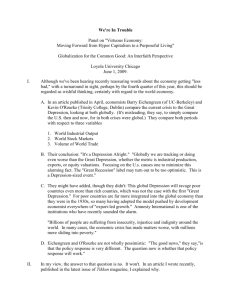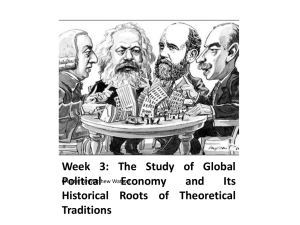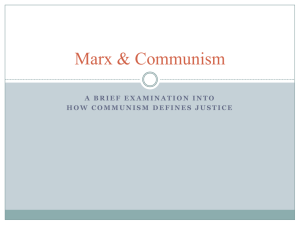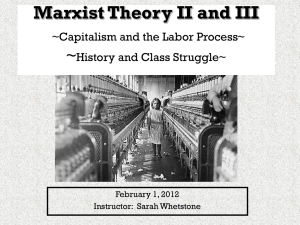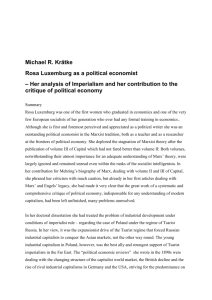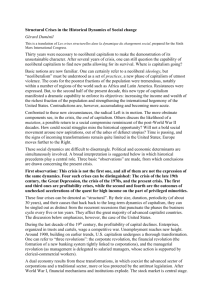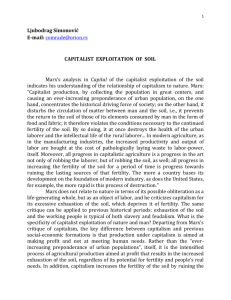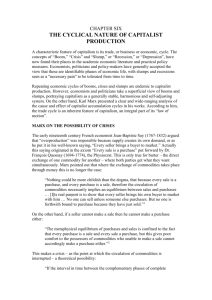SOC 3150: Classical Sociological Theory
advertisement
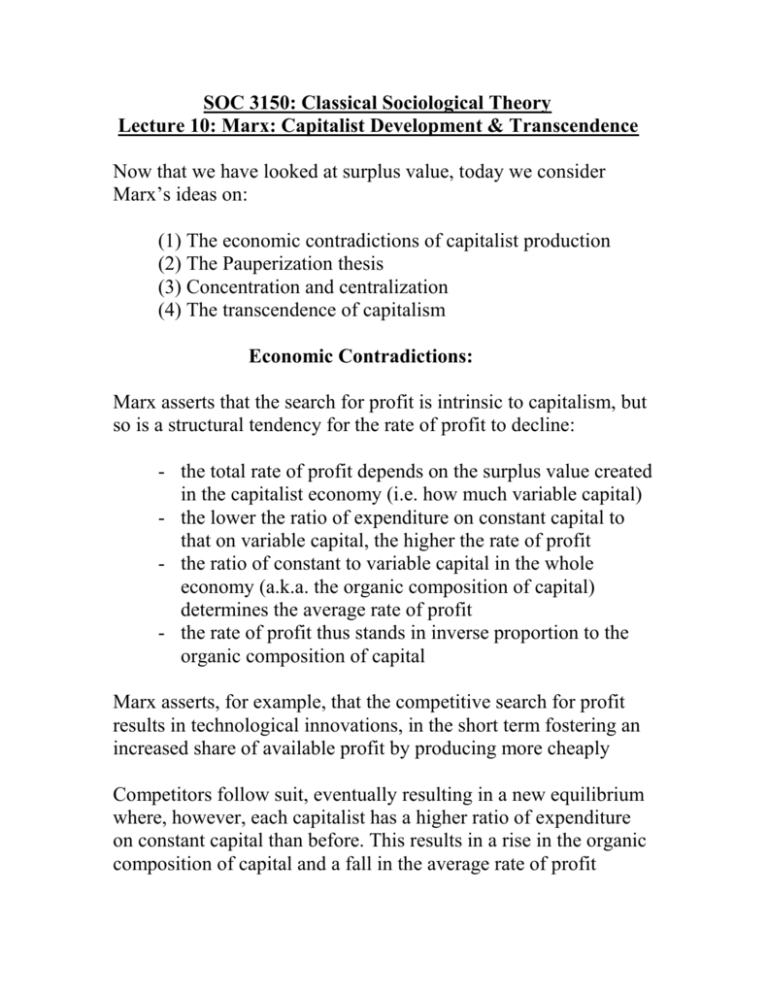
SOC 3150: Classical Sociological Theory Lecture 10: Marx: Capitalist Development & Transcendence Now that we have looked at surplus value, today we consider Marx’s ideas on: (1) The economic contradictions of capitalist production (2) The Pauperization thesis (3) Concentration and centralization (4) The transcendence of capitalism Economic Contradictions: Marx asserts that the search for profit is intrinsic to capitalism, but so is a structural tendency for the rate of profit to decline: - the total rate of profit depends on the surplus value created in the capitalist economy (i.e. how much variable capital) - the lower the ratio of expenditure on constant capital to that on variable capital, the higher the rate of profit - the ratio of constant to variable capital in the whole economy (a.k.a. the organic composition of capital) determines the average rate of profit - the rate of profit thus stands in inverse proportion to the organic composition of capital Marx asserts, for example, that the competitive search for profit results in technological innovations, in the short term fostering an increased share of available profit by producing more cheaply Competitors follow suit, eventually resulting in a new equilibrium where, however, each capitalist has a higher ratio of expenditure on constant capital than before. This results in a rise in the organic composition of capital and a fall in the average rate of profit Offsetting factors in the short term: - increased labour productivity cheap raw materials coming from foreign trade the expansion of the working day depression of wages below their value* The periodic crises which regularly occur in capitalism are manifestations of these ‘contradictions’ in the system Unlike earlier forms of commodity production, where exchange is controlled in the interests of use values, and knowledge of want regulates supply and demand, in capitalism there is a more anarchic system based on money, exchange, and a restless search for profit. With the breaking of the regulative tie, and the expansion of production, there is often an imbalance between the volume of commodities produced and their saleability at the average rate of profit, precipitating a crisis A crisis=an expansion of production beyond what the market can absorb and still return an adequate rate of profit. This sets into motion a vicious cycle: - investment declines part of the labour force has to be laid off consumer purchasing power falls another decline in the rate of profit, etc. This continues until unemployment has increased so much, and wages offered so low, that there exist new conditions for an increase in surplus value, and a resumption of investment. Meanwhile, some businesses close while others take over their market share These crises form a regulating mechanism for capitalism, yet also serve to centralize capital, founded on an exploitative class relationship, around the expansion of capital alone, not the society of producers. Ultimately, the real barrier of capitalist production is capital itself. The Pauperization Thesis: Marx believed that capitalism could not continue to recover from its periodic crises forever through the regulating mechanism above Crises, for example, play a role in fostering revolutionary consciousness among the proletariat The chronically unemployed “industrial reserve army” is an essential feature: labour power is a commodity like no other as there is no obvious factor that prevents a wide divergence of its price from its value* Mechanization, for example, throws many out of work and depresses wages. During prosperous times it depresses wages; in downturns it provides a source of cheap labour inhibiting attempts by the working class to improve its lot Marx discusses the “pauperization” of this group in two senses: (1) (2) That the course of capitalist development involves increasing disparity between the earnings of the working class and the income of the capitalist class; The development of capitalism produces a larger and larger reserve army, the majority of which are forced to live in extreme poverty/at a subsistence level According to Marx: most of the worst forms of material exploitation are concentrated among the reserve army, where there develops an accumulation of wealth at one pole, and of poverty and misery at the other. Concentration and Centralization: The increasing organic composition of capital over time is intimately related to a trend toward its centralization and concentration. Concentration=the process whereby, as capital accumulates, individual capitalists succeed in expanding the amount of capital under their control Centralization=the merging of existing capitals Both, through competition, economies of scale, and periodic crises, lead to larger and larger productive units Centralization is also promoted by the expansion of the credit system/banks, which removes the distribution of capital from the hands of individual capitalists through various forms of circulating credit that serve instead of money Another vehicle for centralization is the development of joint-stock companies, facilitating collaborative investment and separating the owners from the managers Such concentration and centralization serve to highlight the contradictions of the capitalist system, engendering the objective social changes, which, in inter-relationship with the growing classawareness of the proletariat, creates the active consciousness necessary to transform society through revolutionary praxis: - the relative poverty of the mass of the working class the physical misery of the ‘reserve army’ the drop in wages and upsurge in unemployment in crises the concentration of large numbers of workers in the industrial system, where they share the basis for a community of interest/collective organization - the undermining of previous forms of entrepreneurial capitalism All of these factors make possible a revolution to overthrow capitalism The Transcendence of Capitalism: Marx wrote relatively little about the nature of the society that would follow. Indeed, unlike the ‘utopians,” he refused to offer a detailed, comprehensive plan Nevertheless, he distinguished between the transitional stages of socialism and the final outcome: communism Under socialism: - centralization, latent in capitalism, is completed by putting an end to private property through collective ownership - wages are distributed according to a fixed principle: after collective needs are met, the worker is to receive back exactly what he gives to it (rather than have surplus value appropriated) - the role of worker is not abolished, but extended to all - the state is to be subordinated to society (instead of the other way around) through the “dictatorship of the proletariat” - all capital/power is to be wrested from the bourgeoisie - productive forces are to be increased as rapidly as possible - “political” power only disappears once this stage is completed (i.e. the administration of public affairs is to be mediated through the organization of society as a whole) * Communism: - based on an already classless society - the state “withers away” - alienation is overcome by the abolition of the division of labour (i.e. people can work at different things) - relationships will be no longer held under the sway of created, material objects - the universal, interdependent social order, a product of the historically homogenizing aspect of capitalism, will comprise a society where “each works according to his ability and each receive according to his needs.”



